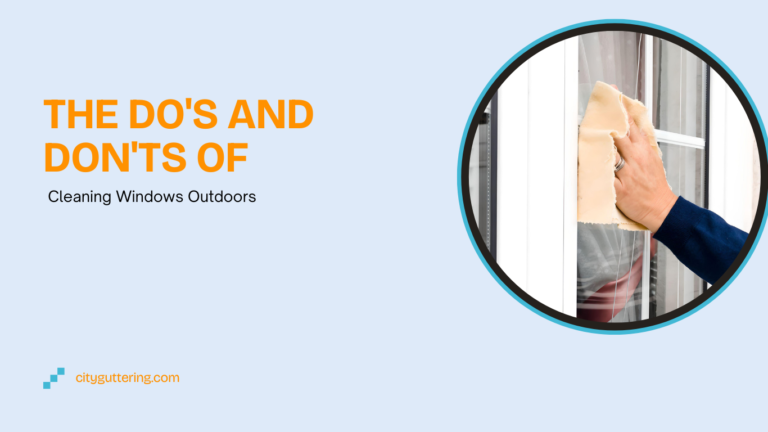Cleaning is part of everyday life, and many people look for natural, affordable solutions rather than relying on harsh chemicals. Vinegar has long been a trusted household staple for cleaning, but most guides point to white vinegar. That often raises a common question: can you use malt vinegar for cleaning?
In this article, we’ll explore what malt vinegar is, how it compares to white vinegar, where it works, where it doesn’t, and whether it has a role in both indoor and outdoor cleaning tasks. We’ll also look at how this ties into bigger cleaning challenges like gutter care, where vinegar alone often isn’t enough.
What is Malt Vinegar and How Does it Differ from White Vinegar?
Malt vinegar is made from malted barley, giving it a distinctive brown colour and strong aroma. It’s a popular condiment in the UK, especially with chips, but it has a different chemical makeup from white vinegar.
The main difference lies in acidity. White vinegar is usually around 5–7% acetic acid, making it powerful enough to break down limescale, soap scum, and greasy residues. Malt vinegar, on the other hand, is less acidic and contains colouring agents from barley. This combination makes it less effective for cleaning and more likely to stain certain surfaces.
So while both are technically vinegar, their practical uses in cleaning are not equal.
Is Malt Vinegar Effective as a Household Cleaner?
Malt vinegar can perform light cleaning tasks, but it doesn’t carry the same versatility as white vinegar. Because of its lower acidity, it struggles to cut through mineral deposits, grease, or bacteria.
That said, you can still use malt vinegar in small household jobs where heavy-duty cleaning isn’t required. For example, deodorising a rubbish bin or giving a quick wipe to a kitchen surface may benefit from malt vinegar. But if you’re expecting spotless mirrors, streak-free glass, or limescale removal, you’ll likely be disappointed.
Pros and Cons of Using Malt Vinegar for Cleaning
Pros
- Easily available in most UK households.
- Non-toxic and eco-friendly compared to harsh cleaners.
- Works as a mild deodoriser in kitchens or drains.
Cons
- Leaves behind a strong, lingering smell.
- Can stain light-coloured fabrics, tiles, or surfaces.
- Lacks the strength to handle limescale, mould, or soap build-up.
- Less versatile than white vinegar, limiting its usefulness.

Common Cleaning Uses of Malt Vinegar at Home
Even though it’s not the strongest option, malt vinegar can still come in handy for certain tasks.
- Glass and mirrors: A mix of malt vinegar and water can remove some smudges, though streaking is more common than with white vinegar.
- Bins and drains: Pouring a small amount into bins or down kitchen drains can reduce unwanted odours.
- Kitchen counters: It can handle light dirt or fresh spills, though it won’t disinfect properly.
If you’re experimenting, always do a patch test first to check whether staining or damage may occur.
Surfaces and Items You Should Avoid Cleaning with Malt Vinegar
Malt vinegar is not suitable for all materials. In fact, using it incorrectly could leave lasting marks.
- Stone countertops like granite or marble – acidity can etch the surface.
- Wood finishes – vinegar strips natural oils and damages polish.
- Painted surfaces – may cause peeling or fading.
- Delicate fabrics – can leave permanent stains.
- Metal fixtures – acidic contact may speed up corrosion.
It’s always safer to stick with the right type of vinegar or professional cleaning methods depending on the surface.
Malt Vinegar vs White Vinegar for Cleaning: Which is Better?
To put the debate into perspective, here’s a comparison:
| Feature | Malt Vinegar | White Vinegar |
| Acidity level | Lower | Higher (5–7%) |
| Cleaning power | Mild | Strong, versatile |
| Smell | Strong, lingering | Sharp but fades faster |
| Risk of staining | High | Low |
| Cost | Similar | Similar |
It’s clear from the comparison that white vinegar is far more reliable for cleaning tasks around the home. Malt vinegar, while natural and non-toxic, simply doesn’t measure up.

Can You Use Malt Vinegar for Outdoor Cleaning?
Outdoors, malt vinegar can help with mild odour control or basic surface cleaning, such as freshening a patio bin or scrubbing a garden table. However, it won’t perform well on tougher jobs like moss removal, algae stains, or blocked gutters.
When it comes to exterior features such as gutters, malt vinegar is ineffective. Gutters accumulate a mixture of dirt, leaves, sludge, and sometimes algae. These require stronger cleaning techniques and tools, far beyond the mild acidity of malt vinegar.
The Role of Vinegar in Gutter Cleaning – What Works and What Doesn’t
Vinegar is often suggested for DIY cleaning, especially for drains and small kitchen tasks. But when applied to gutters, it quickly shows its limitations. Gutters need more than a mild cleaner – they require physical clearing of debris, safe ladder work, and sometimes professional repair.
Trying to clean gutters with malt vinegar is not only impractical but potentially risky if it encourages homeowners to climb ladders without the right equipment. Even white vinegar, while stronger, won’t be able to deal with the kind of build-up gutters experience over months and years.
Why Professional Gutter Cleaning is a Better Choice in London and Surrey
For homeowners in London and Surrey, regular gutter maintenance is vital. Blocked or leaking gutters can cause water damage, mould growth, and structural problems. While DIY cleaning methods are tempting, they rarely solve the root issue.
Professional services, like those offered by City Guttering London, ensure gutters are properly inspected, cleared, and repaired where necessary. Our team handles everything safely and efficiently, from routine maintenance to emergency repairs. Unlike vinegar or DIY quick fixes, our methods provide lasting results and peace of mind.

Final Thoughts – Should You Use Malt Vinegar for Cleaning?
Malt vinegar can be used for cleaning, but only in limited ways. It may help reduce odours, give a quick wipe to a surface, or freshen a bin. Beyond that, its lower acidity and strong smell make it a poor substitute for white vinegar.
For households, white vinegar remains the go-to option for natural cleaning. For outdoor tasks like gutters, though, vinegar of any type is not the answer. Professional gutter cleaning ensures safety, effectiveness, and protection for your home.





